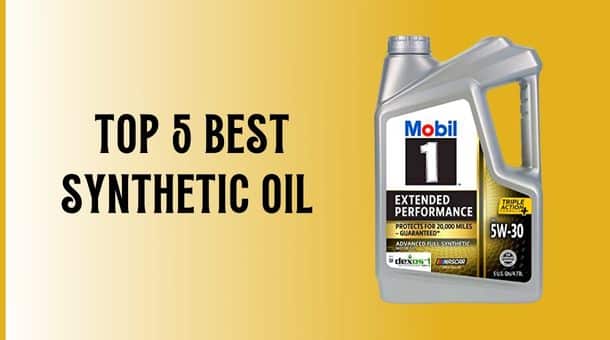The article will discuss the Best Synthetic Oil to protect your engine. The most efficient synthetic oils can improve performance, keep your engine clean, and perform equally well at high and low temperatures. They also aid in protecting your engine from wear in low.
What is Motor Oil?
Motor oil contains two major components: base oils and additives. The base oils comprise the majority of oil (roughly 70 to 80 percent). Base oil is comprised of:
- Petroleum (conventional oil)
- A chemically synthesized element (synthetic oil)
- A mix of petroleum and synthetics (known as semi-synthetic)
The Best Synthetic Oil to Keep Your Engine Healthy
Let’s Get a Quick overview of them:
| Product Name | Image | Buying URL | Price |
| Editor’s Pick: Royal Purple High-Performance Synthetic Oil | 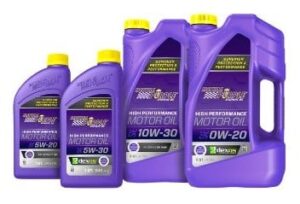 | ||
| Best for Diesel Engines: Shell RotellaT6 Full Synthetic Diesel Oil | 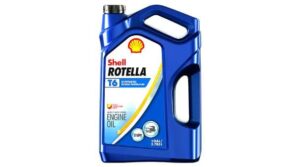 | ||
| Mobil 1 Extended Performance Synthetic Motor Oil | 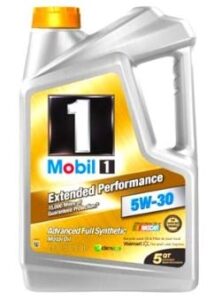 | ||
| Pennzoil Platinum Full Synthetic Motor Oil | 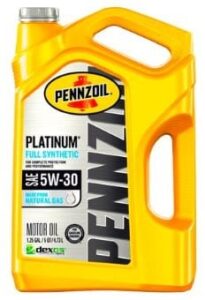 | ||
|
Mobil 1 High Mileage Full Synthetic Motor Oil | 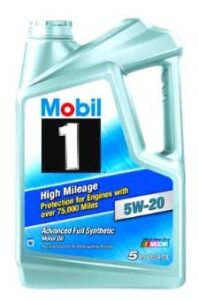 |
1. Editor’s Pick – Royal Purple High-Performance Synthetic Oil
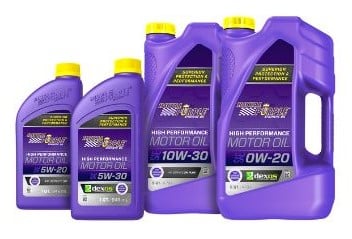
The brands listed on this list are well-known and trusted by enthusiasts of the automotive industry. However, Royal Purple also has a good reputation among high-performance automobile owners.
The API-licensed Royal Purple oil has the most up-to-date API and ILSAC oil licenses for engine oils, in addition to the GM Dexos1 approval for gasoline engines.
Royal Purple’s Synthetic Oil is a higher-tech additive to keep metal-to-metal contact out of GM dexos1 and ILSAC GF-5 standards. It improves the efficiency of the use of fuel and better protection of the vehicle’s exhaust emission equipment.
The product is also equipped with an anti-wear additive, patent-pending. It reduces the negative effects of exhaust gases on catalysts.
2. Best for Diesel Engines – Shell RotellaT6 Full Synthetic Diesel Oil
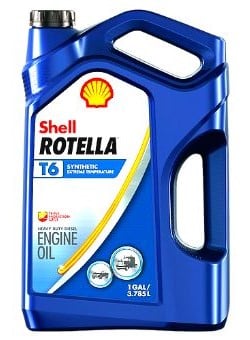
If you have an engine powered by diesel and are looking for an alternative to synthetic oil, think about Shell’s Rotella. Compared to the conventional 15W-30 oil, this product could improve fuel efficiency by as high as 2.8 percent.
This product’s Triple Protection Plus formula combines 100 synthetic base oils enriched with modern additives to protect equipment and longer engine life.
It is made from additives that help protect against the detrimental effects of dirt soot and other harmful pollutants.
3. Mobil 1 Extended Performance Synthetic Motor Oil
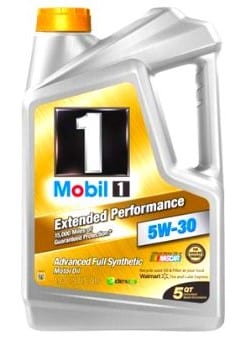
With an innovative full synthetic formula, Mobil 1’s Extended Performance Synthetic Oil is designed to stop the build-up of sludge and deposits from extending the engine’s life and helping maintain the stability of oil viscosity.
This oil can provide superior overall lubrication and wear protection in various operating conditions due to the precise blend of performance-enhancing ingredients.
It also offers excellent resistance to oxidation and temperature and superior control of oil breakdown.
4. Pennzoil Platinum Full Synthetic Motor Oil

Pennzoil Platinum Full Synthetic Motor Oil was developed using Pennzoil’s PurePlus gas-to-liquid method. This patent-pending process transforms natural gas into a premium quality base oil, which is completely artificial.
Pennzoil says its base oil has a purity of 99.5 percent, meaning it is less contaminated than the base oil made from crude oil.
Together with an extremely powerful additive process, it can yield as much as 500 miles more annually in the efficiency of the engine compared with an engine with a dirty engine.
5. Mobil 1 High Mileage Full Synthetic Motor Oil

Mobil 1 offers a synthetic oil suitable for vehicles that travel more than seventy-five miles to guard your car against the high miles. It has great overall lubrication and wear protection.
This oil has been specifically developed to surpass Mobil 1’s conventional oil for vehicles with high mileage.
It is specifically made to protect the most important engine components used in vehicles with high mileage and reduce the deposits and sludge that conventional oil leaves behind.
The formula is also helpful in preventing leaks that could occur on older engines.
Is Synthetic Oil Better for Your Car?
There’s been lots of discussion about the old or. Synthetic oil debate over the years. There is a consensus that the latter is indeed costly initially, but it’s much cheaper once you look at its long time span.
When is the best time to change the oil in your car?
Altering the oil inside the vehicle is usually an easy process at a modern automotive service facility. The oil you are lubricating inside your vehicle is essential for its health.
Clean, well-maintained oil improves your car’s efficiency and increases the engine’s longevity. Why are people delaying the process until they encounter an obvious problem? When this happens, you should anticipate your vehicle to show at the very minimum one of the indicators listed below.
1. Check Engine or Oil Change Light
The most obvious indication of a problem with your oil comes in the car itself. The light that indicates the need to change the oil on your car will flash if there is no gasoline inside the engine.
So, look at the dipstick and determine the issue. In more serious cases, the check engine light will flash.
This is the vehicle’s method of alerting you that something is wrong and that your engine could be in danger of destruction because of problems with components or inadequate lubrication.
2. Engine Noise and Knocking
Oil protects an engine’s components, helps prevent the metal from moving, and ensures that the engine runs silently. If your oil isn’t working as it should, the engine’s sound will become louder.
In extreme cases, there could be a sound of rumbling or knocking, which signals an engine breaking into pieces because of insufficient lubrication.
3. Dark, Dirty Oil
Clean oil is amber in color and is a little translucent. If used, it will fill up with an accumulation of particles from the engine. It will then become darker. It’s difficult to tell when this begins to happen, so be vigilant and check the oil for leaks at least every month.
To do this, remove the dipstick and clean it before putting it back in the tank. Then, take it out a second time. If you cannot discern the dipstick within the oil, then it’s time to change the oil.
4. Oil Smell Inside the Car
If you smell oil in the vehicle, It could be an indication that there are leaks within the engine. The vehicle may be heating up if you notice gas or exhaust emissions. It’s important to arrange maintenance as soon as possible in any situation.
5. Exhaust Smoke
A translucent vapor is always released through the exhaust pipe of your vehicle. It’s the right time for an engine check if it changes into smoke. It could mean your engine has been damaged or the oil leaks.
6. Excessive Mileage
If you’ve traveled a lot in the last month, you should consider whether you’ll need an oil change sooner than the usual time. Each car is distinctive and requires a change using its oil at least every 3000 miles or three months.
New vehicles typically require an oil change every six months or 6000 miles. Check out the owner’s manual for specific guidelines. Consider a high-mileage oil for older cars.
How Often Should You Change Your Engine Oil?
The rule was that the car’s oil should be changed every 3000 miles. In reality, due to engine technology advancements, most modern automobiles today can travel from 7,500 to 10,000 miles before needing to have the oil changed.
The most efficient method to pinpoint the exact time the oil in your vehicle needs to be replaced is to consult your car’s owner’s manual.
Certain driving conditions can alter the frequency your oil requires to be changed. Your oil may need frequent replacement if you’re on the racing track, road, or towing.
Visit any of the Basil Service Centers, or our highly trained technicians can help you determine the best time to change your oil.
It is safe to trust that your Basil oil replacement will be done on time, and you’ll be back in your car at Lockport or Orchard Park.
Where do I go to have my oil changed?
If you’re in Vancouver, Edmonton, Red Deer, London, or Toronto, There’s a variety to pick from locally-owned Go Auto dealerships.
In another city, you can always find JiffyLube and Mr. Lube, car dealerships, and mechanics and tire shops in your local area. If you’re capable of it, you’ll be able to finish the task from your garage!
Why is it crucial to have your oil changed?
If you’re an honest owner of your car, you’ll get the most value from your vehicle. If you maintain track of your vehicle’s maintenance schedule, including an oil change and other maintenance, your car will last longer.
The most dangerous scenario is your car failing because you didn’t alter your oil!
Oil changes are vital because they aid in keeping your car in good condition and roadworthy.
In the end, vehicles aren’t cheap, and the cost of fixing your vehicle or buying another brand if you don’t make an oil change might be greater than an oil change for $50.
FAQS
Frequently asked questions about synthetic oil are :
What is the drawback of synthetic petroleum?
A few disadvantages of synthetic oils that you need to be aware of are: The most evident disadvantage of synthetic oils is their cost.
The price of synthetic oil could be up to 4 times that of conventional oils. Synthetics are more prone to the precipitation of additives in cold storage temperatures.
Can you make use of synthetic oil in older vehicles?
It performs better, lasts longer over the long haul, and doesn’t contain chemicals that could cause harm to older models.
The most recent artificial oils can be used on all types of vehicles from new models to classics, and even non-classics.
Can synthetic oil damage the engine?
Synthetic oils typically provide more protection than conventional oils; however, changing between standard and full synthetic oil will not cause damage to engines.
Do you need to change your oil before the when or at what mileage?
Quick-lube chains usually suggest changing an oil every three months or 3000 miles. However, certain mechanics might declare that regular adjustment isn’t adequate.
Most auto owners’ guides suggest replacing the oil more frequently, typically at 7,500 or 5k miles.
What is the result if I use 5w40 in place of 5w30?
Practically, all oils will be viscous at lower temperatures until 30degC.
However, 5w40 oil will be more efficient than fivew30 when temperatures are higher, as it can be effective at temperatures of 50degC instead of 30degC.
How do you react if you go too long without changing your oil?
A complete engine failure If you sit for a long time before altering your motor oil, this may cause damage to your vehicle.
Once the motor oil has changed into slime, it cannot remove heat from the vehicle.
This could result in the engine not functioning completely, requiring an entirely new engine or even a brand-new vehicle to be fixed.

